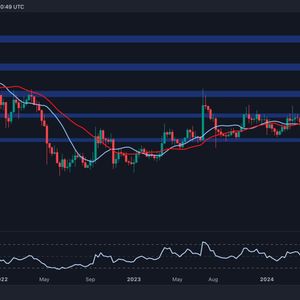Summary Options approval for BlackRock's iShares Bitcoin Trust ETF is a significant boost for Bitcoin, potentially increasing its price and liquidity. The introduction of non-futures ETFs options chains and subsequently volatility selling products could attract more investors by offering high distribution rates and perceived safety. Recent net inflows into global crypto funds suggest growing investor confidence, driven by dovish FOMC comments and interest rate cuts. The regulatory environment appears to be shifting towards a more crypto-friendly stance, as evidenced by the approval of Ethereum and Bitcoin ETF options. Last week, options were approved for BlackRock's ( BLK ) iShares Bitcoin Trust ETF ( IBIT ). This is big news for Bitcoin ( BTC-USD ). I expected the SEC to delay this as long as possible. I expect this, as well as other factors, to be quite supportive of the Bitcoin price in the near term. It's true that option contracts already trade on crypto exchanges and are available on the Bitcoin futures ETF. In theory, it shouldn't be a significant change. However, this is a major ETF with a tremendous amount of AUM and daily volume. Data by YCharts A non-futures ETF is considered more attractive by some investors. The fees on this generation of ETFs are also considerably lower, which is a real advantage. Perhaps more important than the direct liquidity boost from this new option chain is the fact that other ETFs will follow, and now nothing stands in the way of a put-selling or covered-call-selling product being introduced. Products like that exist for single-name stocks like Nvidia ( NVDA ), Tesla (TSLA), and Coinbase ( COIN ). These are then marketed as yield vehicles and can flaunt very high distribution rates. I've written about several of these, for example Why A 106.68% Yield May Not Be Enough , as I'm fascinated by these products and their effects on the underlying market. For good measure, usually, I'm not a fan of getting into these, although there are exceptional circumstances where it could be interesting. Bitcoin is known as a volatile asset. Annualized at-the-market volatility for Bitcoin has been around 47% over the past 7 days and around ~60% over the past 180 days. Volatility selling products based on Bitcoin will be able to advertise very high expected distributions or projections based on historical data. Think of annualized distribution rates of 100%+. Products that mimic a covered call position are often deemed "safer". I'm not sure that they are. However, I do believe they could draw new investors into an asset. Think of investors who are interested but find it to be a bit too speculative. Both the greenlighting of these options and secondary the launch of products with the above profile will, over time, lead to Bitcoin volatility going down further. A process that will allow another group of traders/investors (quants/trend-followers) that volatility weight their exposures to ramp up exposure. Meanwhile, global crypto funds are now experiencing net inflows for the 2nd week in a row, according to this report by CoinShares. This could be random noise. The firm specifically calls out the 50bp rate cut as a catalyst. I'd argue the market has been pricing in a few cuts for a while now. Still, the decision may have given some investors the reassurance they were looking for. I feel compelled to touch on a political sensitive issue for a minute. Personally, I have no direct stake in the U.S. election, as I'm Dutch. I'm discussing it because crypto has turned into somewhat of a battleground. Vice-President Harris now appears to be interested in a less restrictive crypto climate ( per Bloomberg ). I could be mistaken, but I viewed the Ethereum ETF approval earlier this year as a key shift in thinking on the Democratic side. In my opinion, this event could have been delayed by the SEC a while longer. Up to that point, the crypto community had generally been disappointed with the SEC's stance vs crypto. Meanwhile, Trump is increasingly campaigning as a pro-crypto candidate as well. Both candidates are now more open about crypto . This means there isn't really an election outcome that leads to a worse regulatory outcome. Political crypto headlines are also unlikely to be negative because neither candidate sees value in opposing crypto. The final reason it's a good time to look at Bitcoin is that Mount Gox and German government distributions have been a recent overhang on the market. Coinshares did an in-depth analysis of this overhang here. This is a chart from that report: bitcoin liquidity events (Coinshares) Coinshares concluded, which has more or less borne out, that the impact of this selling would be relatively muted. Their primary argument is that the selling wouldn't happen all at once. The one argument from the report I don't entirely agree with is that holders could have sold claims (to specialized claims buyers), and since they did not, this supposedly indicates they aren't interested in turning these positions from Bitcoin into USD. The claims buyers are generally professional specialized parties, and claims-sellers to a degree realize they are not the smart money in these transactions. It makes sense these parties are looking for a high rate of return as there is quite a bit of risk to it and these investments can't be levered up. Sellers simply may not have wanted to take the haircut. Especially as these distributions were supposed to take place quite a bit earlier. Yet, parties that wanted to sell could also have sold Bitcoin futures short or bought puts in advance of the distributions. In these cases, the market impact happened ahead of the distributions. Data by YCharts My first article on Bitcoin dates back to 2016. At that time, it traded at ~$630. The ticker BTC-USD wasn't available on the platform. In that article, I floated the idea that Bitcoin could reach a $8 trillion market cap based on the "digital gold" idea. I don't think viewing Bitcoin as the "digital gold" is correct. However, it helps to construct an idea of what an upside scenario may look like. Since that time, people dug up more gold AND it advanced in price. The total value of all existing gold is estimated to be around $16 trillion. Bitcoin advanced more rapidly, and its total value is now around $1.3 trillion. In my first article on Bitcoin, I said this upside scenario could result in a 900x+ bagger. That's now less reasonable. That same scenario being achieved would still result in a 10x. On the other hand, it has become way less likely Bitcoin will be abandoned or turn out a failure. Big picture, I still think this is an asymmetric bet. I'd like to get out of Bitcoin if it dropped below $50k. This would indicate a clear break from the recent bullish trajectory, and I would reassess based on the events driven such bearish price action. Seeking Alpha has seasonality data on the Grayscale Bitcoin Trust ( GBTC ), the oldest Bitcoin fund, going back 8 years. If you take the average returns over the final 3 months of the year and assume Bitcoin appreciates by that figure, it will be at $88k at year-end. I think that's a big ask from Bitcoin at this stage, but it should be reasonable as the higher end of what's possible. Based on the current bullish price action, the seasonality data, experience with previous bull runs, I would not be surprised if Bitcoin touched $90K in the next 3–12 months.










